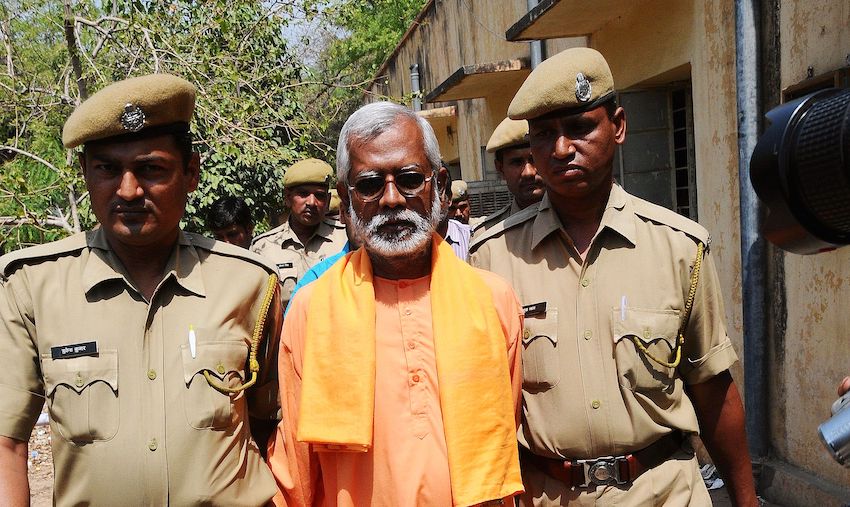Samjhauta Express blast case: All 4 accused including Aseemanad acquitted, BJP hails ‘historic’ verdict; outraged Pakistan summons Indian envoy
 Aseemanand aka Naba Kumar Sarkar.
Aseemanand aka Naba Kumar Sarkar.
New Delhi: A special National Investigation Agency court in Haryana’s Panchkula, on Wednesday, acquitted all the four accused in the 2007 Samjhauta Express blast case, in which 68 people, mostly Pakistanis, were killed. While delivering the verdict, the NIA special judge, Jagdeep Singh, also dismissed the plea filed by a Pakistani woman, Rahila Wakil, for examining some eyewitnesses from her country.
Among those acquitted is self-styled monk Naba Kumar Sarkar alias Swami Aseemanand. Apart from Aseemanand, the other three accused who were acquitted are: Lokesh Sharma, Kamal Chauhan and Rajinder Chaudhary.
Aseemanand’s cousel, Mukesh Garg, told reporters that the NIA court had to acquit all the accused as the prosecution was not able to prove the charges against them. Aseemanand was accused of providing logistical support to those who carried out the blast. He was out on bail, while the three others who faced trial are in judicial custody.
The saffron-clad Aseemanad, who is a former Rashtriya Swayamsevak Sangh member, was also accused in two other bombings – the May 2007 blast in Hyderabad’s Mecca Masjid and the October 2007 blast in Ajmer’s Moinuddin Chisti dargah. However, he has been acquitted in both the cases – in April 2018 and March 2017 respectively.
The case
On February 18 in 2007, a bomb blast was carried out on the Samjhauta Express train, which runs between Delhi and Lahore, at Haryana’s Panipat. In the blast, 68 people including 44 Pakistani citizens, 10 Indian citizens and 14 unidentified people were killed.
The Haryana Police registered a case, but the probe was soon handed over to the NIA, in July 2010.
Initially, eight people were accused in the case. Apart from Aseemanand, Lokesh Sharma, Kamal Chauhan and Rajinder Chaudhary – the four who were acquitted on Wednesday, three other accused – Amit Chouhan alias Ramesh Venkat Malhakar, Ramchandra Kalsangra and Sandeep Dange – are on the run and have been declared “proclaimed offenders” in the case. Another accused, Sunil Joshi – the alleged mastermind, was shot dead near his home in Madhya Pradesh’s Dewas district, in December 2007.
The NIA had claimed that the accused were “upset with terror attacks on Hindu temples” and then “conspired to take revenge”.
BJP hails verdict as ‘historic’
The BJP described the verdict as “historic” and insinuated that the charges against the accused were politically motivated to validate the Congress’s “saffron terror” theory.
Senior BJP member and Union law minister Ravi Shankar Prasad said, “The historic verdict in the case is an indication as to how the previous (Congress-led) UPA government sought to play politics with terror. It was based upon very imperfect evidence. This has to be seen in conjunction with the ‘saffron terror’ issue raised by the-then home minister, Sushilkumar Shinde, and also echoed by P Chidambaram.”
Questions raised on NIA’s probe
Calcutta’s Telegraph reported that a former Intelligence Bureau director told the newspaper that the verdict was a big setback for the NIA.
The newspaper quoted the former IB director as saying: “So, no one killed 68 people and they died on their own. It’s so unfortunate that evidence changes with the change in government. It speaks volumes about our criminal justice system. Who do we trust?”
Pakistan summons Indian envoy
The Pakistani foreign office, in a statement, on Wednesday, said the country’s acting foreign secretary summoned the Indian high commissioner, Ajay Bisaria, to lodge Islamabad’s strong protest.
The Pakistani foreign office statement said the acting foreign secretary “stressed that Pakistan had consistently raised the lack of progress and the subsequent, concerted attempts by India to exonerate the perpetrators of this heinous terrorist act in which 44 innocent Pakistanis lost their lives.”
The statement also said the Pakistani acting foreign secretary also told Bisaria that the “systemic Indian decision to gradually exonerate and finally acquit the perpetrators, was not only a gross reflection of India's callous insensitivity to the plight of the 44 families of the deceased Pakistanis, who hoped that India would but also reflective of the Indian state policy of promoting and protecting Hindu terrorists.”
The foreign office statement added that “Pakistan called upon India to explore judicial remedies to ensure that the perpetrators are brought to justice.”
[This story has been updated at 3.18am, March 21, 2019.]




Leave Your Response